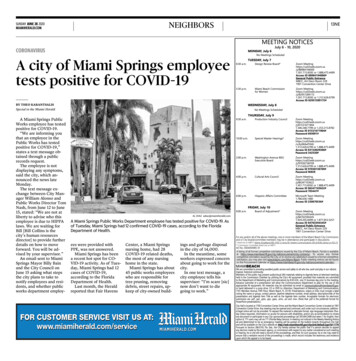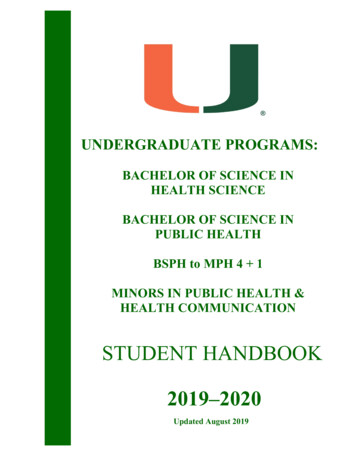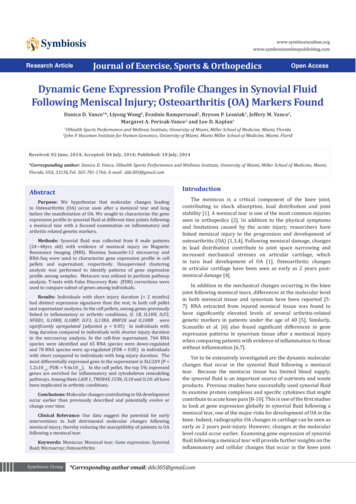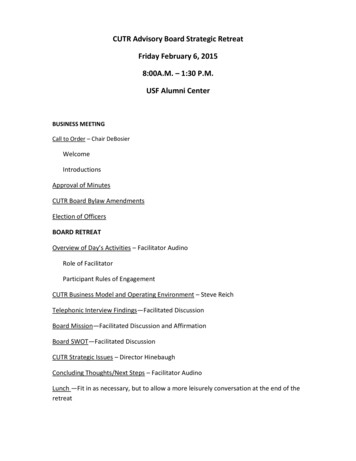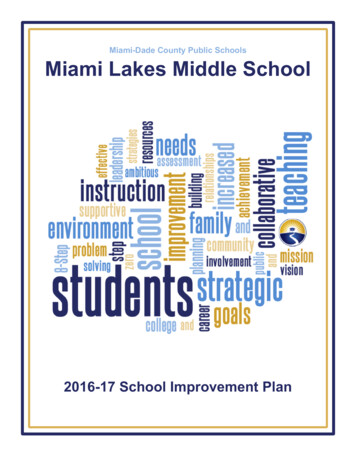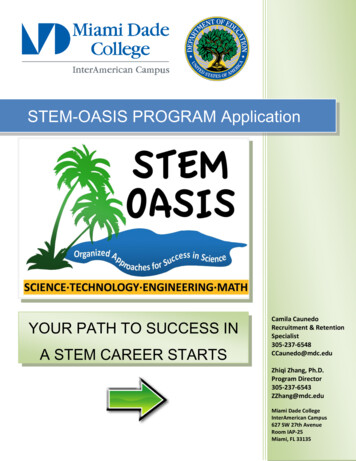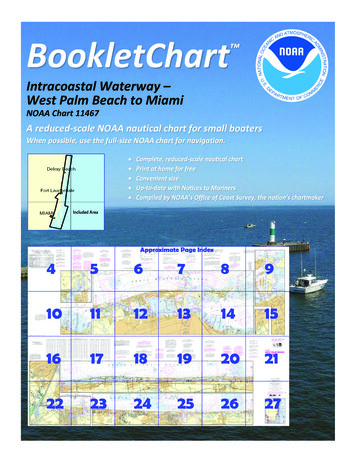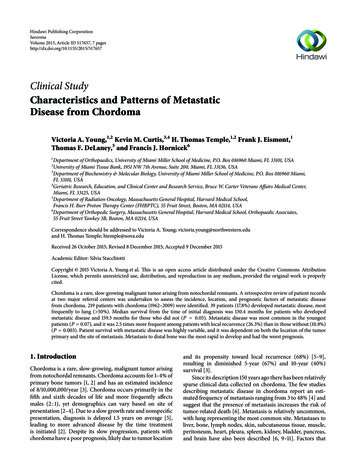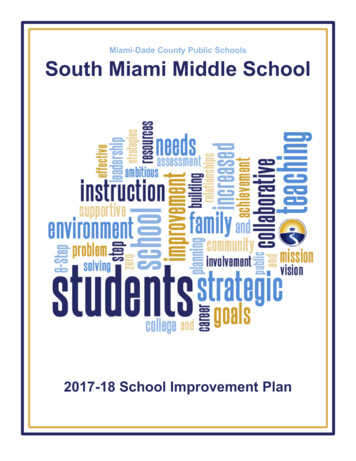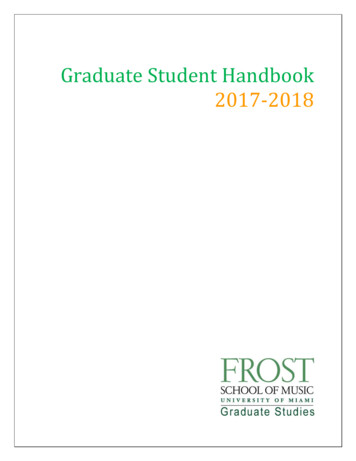
Transcription
Graduate Student Handbook2017-2018
Graduate Student Handbook2PURPOSEThis handbook serves as a guide to graduate studies in the Frost School of Musicat the University of Miami. It does not replace or diminish the use of theAcademic Bulletin or any other official policy statement of the University or theGraduate School.Graduate students should review and consult the Academic Bulletin throughoutthe course of their academic study: http://bulletin.miami.edu/Additionally, graduate students should review and consult the website for theGraduate School: http://www.miami.edu/gs/index.php/graduate schoolShannon K. de l’Etoile, Ph.D.Associate Dean of Graduate StudiesManny SantanaManager of ProgramsGraduate StudiesOffice of Graduate Studies in MusicUniversity of MiamiPhillip and Patricia Frost School of MusicMusic Administration CenterPick Hall, Room 105Coral Gables, Florida 33124(305) 284-6913e-mail: gradstudies.music@miami.eduweb: Frost School of Music, Graduate tmlPlease note: if this link does not connect directly to the My.Frost Portal, pleasecut and past the URL into your browser’s address bar. You will then need toenter your security credentials.
Graduate Student Handbook3TABLE OF CONTENTSOverview of the Frost School of MusicFrost School of Music Administration 5Department Chairs and Program Directors . 6Members of the Graduate Faculty . 9Academic and Financial MattersEntrance Examinations for New Students .The Importance of Email Tuition, Fees, and Health Insurance .Advising and Registration .Full-Time Enrollment, Credit Overload, and Tuition Scholarships. .Graduate Level Courses Graduate Student Ensemble Participation Enrollment in Applied Lessons Special Projects .Special Topics .Change of Major/Status/Degree .Course Substitutions .Course Waivers .Leave of Absence .Readmission .Grades and Credits .Repeat Rule .Transfer of Graduate Credit .Levels of Graduate Study Time to Completion .1119202122232324252627272828282930303131Graduate Degree ProgramsGraduate Degrees and Concentration Codes 32General Procedural Guidelines: Artist Diploma inInstrumental Conducting (MCDI), and Performance (MIPF, MKPF, MVPF) . 34General Procedural Guidelines: Master of Music Degree inConducting (MCDC, MCDI) or Performance (MIPF, MIPW, MKPF, MSJI,MSJV, and MVPF) . . 37General Procedural Guidelines: Master of Music Degree inMusicology (MUSY), Music Education (MEDU), orMusic Therapy (MTYP) . 49General Procedural Guidelines: Masters Degrees inMusic Business and Entertainment Industries (MBEI),Arts Presenting and Live Entertainment Management (MPRS),Music Engineering Technology (MUEE), or
Graduate Student Handbook4Media Writing and Production (MWPD) . 58General Procedural Guidelines: Master of Music Degree inKeyboard Performance and Pedagogy (KPED) . 67General Procedural Guidelines: Master of Music Degree inJazz Pedagogy (JPED) or Studio Jazz Writing (SJWR) . 71General Procedural Guidelines: Master of Music Degree inComposition (MTCP), or Digital Arts and Sound Design (MTCD) 75General Procedural Guidelines: Doctor of Musical Arts Degree inConducting (MCDC, MCDI), Performance (MIPF, MIPW, MKPF, MKPA,MSJI, MSJV, MVPF), Composition (MSJC, MTCP), andPedagogy and Performance (KPED, VPED) 79General Procedural Guidelines: Doctor of Philosophy inMusic Education (MEDU), and Music Education with Music TherapyEmphasis (MEDU) .105Frost School of Music PoliciesPolicy Regarding Student Identification and Use ofFrost School of Music facilities Room Scheduling Policy .Foster Building Policy .Smoking Policy Food and Beverage Policy Keyboard Service .Recording Services Policies .Graduate Conducting Recitals Policies .Recital Program Policy Policy for Requesting a Concert Hall Date .Technology Center Lab Policy .Locker Rental Policy Posting Policy .116116116117117117117119119120121122123Resources for Graduate StudentsWriting Center . 124Graduate Student Association . 125GradNews . 126Graduate Activity Fee Allocation Committee (GAFAC) . 126Office of Academic Enhancement 127Health and Well-Being. 128International Student and Scholar Services . 129AppendixCopyright Considerations for Final Projects 130
Graduate Student Handbook5FROST SCHOOL OF MUSICADMINISTRATIONMaurice Gusman Concert Hall2017-2018 Academic YearDeanShelton BergAssociate Dean of AdministrationRaul MurcianoAssociate Dean of Graduate StudiesShannon de l’EtoileAssociate Dean of Undergraduate StudiesSteven MooreAssociate Dean for Strategic InitiativesRey SanchezAssistant Dean of DevelopmentHolly FreyreDirector of Recruitment and AdmissionsKaren KerrDirector of Business OperationsBarbara HamDirector of Marketing and CommunicationPatricia San PedroManager of Concert Halls andDirector of TechnologyWilliam DillonDirector of Recording ServicesDana Salminen
Graduate Student HandbookDEPARTMENT CHAIRS AND PROGRAM DIRECTORSThe Frost School of Music is comprised of eight, degree-granting academic departments.Each department is identified by a three-letter abbreviation and overseen by a designatedDepartment Chair. Each department further includes various academic programs that are runby designated Program Directors. The list below identifies all Frost School of MusicDepartments, as well as Department Chairs and Program Directors.Department of Musicology (MCY)ChairDavid AkeProgram DirectorDavid AkeDepartment of Music Education and Music Therapy (MED)ChairDon CoffmanProgram DirectorsStephen Zdzinski, Music EducationTeresa Lesiuk, Music TherapyDepartment of Instrumental Performance (MIP)ChairRob CarnochanProgram DirectorsThomas Sleeper, Instrumental Ensembles and ConductingRobert Carnochan, Director of Wind Ensemble ActivitiesJay Rees, Athletic BandsRichard Todd, BrassSvetoslav Stoyanov, PercussionRoss Harbaugh, StringsMargaret Donaghue, Woodwinds6
Graduate Student HandbookDEPARTMENT CHAIRS AND PROGRAM DIRECTORS(CONTINUED)Department of Keyboard Performance (MKP)ChairSantiago RodriguezProgram DirectorsSantiago Rodriguez, Piano PerformanceNaoko Takao, Keyboard Performance and PedagogyDepartment of Music Media and Industry (MMI)ChairSerona EltonProgram DirectorsGary Wood, Arts Presenting and Live Entertainment ManagementRey Sanchez, Bruce Hornsby Creative American Music ProgramChris Boardman, Media Writing and ProductionSerona Elton, Music Business and Entertainment IndustriesWill Pirkle, Music Engineering TechnologyDepartment of Studio Music and Jazz (MSJ)ChairJohn DaversaProgram DirectorsCharles Bergeron, Jazz PedagogyGary Lindsay, Studio Jazz Writing; Jazz CompositionGary Keller, Studio Music and Jazz - InstrumentalKate Reid, Studio Music and Jazz - VocalDepartment of Theory and Composition (MTC)ChairCharles MasonProgram DirectorsCharles Mason, Theory and Composition; Digital Arts and Sound Design7
Graduate Student HandbookDEPARTMENT CHAIRS AND PROGRAM DIRECTORS(CONTINUED)Department of Vocal Performance (MVP)ChairEsther Jane HardenberghProgram DirectorsKaren Kennedy, Choral ActivitiesEsther Jane Hardenbergh, Vocal Pedagogy and PerformanceDivision of DanceCoordinator: Carol Kaminsky8
Graduate Student Handbook9MEMBERS OF THE GRADUATE FACULTYPLEASE NOTE: Faculty members marked with an asterisk (*) are eligible to chairdoctoral committees.Department of Musicology (MCY)David Ake*Melvin Butler*Marysol Quevedo*Nancy ZavacDepartment of Music Education and Music Therapy (MED)Carlos Abril*Donald Coffman*Shannon de l’Etoile*Teresa Lesiuk*Corin Overland*Brian T. Powell*Kimberly Sena-Moore*Stephen Zdzinski*Department of Instrumental Performance (MIP)Gabriel Beavers*Robert Carnochan*Charles Castleman*Tim ConnerMargaret Donaghue*Scott FlavinRoss Harbaugh*Trudy Kane*Jodi Levitz*Craig Morris*John Olah*Rafael PadronBrian T. Powell*Jay Rees*Thomas Sleeper*Svetoslav Stoyanov*Aaron Tindall*Richard Todd*Dale UnderwoodRobert WeinerDepartment of Keyboard Performance (MKP)Kevin Kenner*Santiago Rodriguez*Naoko Takao*Tian Ying*PLEASE NOTE: Faculty members marked with an asterisk (*) are eligible to chairdoctoral committees.
Graduate Student Handbook10MEMBERS OF THE GRADUATE FACULTY (CONTINUED)PLEASE NOTE: Faculty members marked with an asterisk (*) are eligible to chairdoctoral committees.Department of Music Media and Industry (MMI)Christopher Bennett*Christopher BoardmanSerona Elton*William C. PirkleCarlos Rivera*Brian Russell*Reynaldo Sanchez*Gary WoodDepartment of Studio Music and Jazz (MSJ)Martin Bejerano*Shelton Berg*Charles BergeronJohn Daversa*Gary KellerGary Lindsay*Dante LucianiBrian Lynch*Kate Reid*Brian Russell*Steve RuckerDepartment of Theory and Composition (MTC)Juan Chattah*Shawn Crouch*Dorothy Hindman*Juraj Kojs*Charles Mason*Lansing McLoskey*Department of Vocal Performance (MVP)Jeffrey Buchman*Coreen Duffy*Karen Kennedy*Esther Jane Hardenbergh*Alan Johnson*Judy Marchman*Corin Overland*Frank Ragsdale*Robynne Redmon*PLEASE NOTE: Faculty members marked with an asterisk (*) are eligible to chairdoctoral committees.
Graduate Student Handbook11ENTRANCE EXAMINATIONS FOR NEW STUDENTSEntrance Exams in Musicology and Music TheoryThe Frost School of Music requires certain incoming graduate students to take entrance examsin Musicology and Music Theory prior to enrolling in courses. Graduate students areexpected to be well-prepared for these exams. Any student who does not pass an entranceexam must fulfill a remediation requirement (explained below). Students who do not fulfillthe remediation requirement are subject to the following consequences: For Masters degree students who do not fulfill the remediation requirement, the finalproject (i.e., defense of research, final recital, cumulative exam, etc.) will be cancelledand graduation will be delayed, possibly by an entire semester. Students will befinancially responsible for this extension of the degree program (i.e., students mayneed to enroll in and pay for additional credits). Doctoral degree students who do not fulfill the remediation requirement will not beable to apply for Doctoral Committee Approval, as needed for DoctoralCandidacy. Consequently, such students will not be able to move forward withproposing and completing the doctoral essay, and thus graduation is likely to bedelayed. Students will be financially responsible for any resulting extension of thedegree program (i.e., students may need to enroll in and pay for additional credits).Who Should Take These Exams?If you are pursuing one of the following degrees, you are required to take these exams:Masters Degree Programs:Master of Music in MusicologyMaster of Music in Music Education (including Certification students)Master of Music in Music Therapy (including Equivalency students)Master of Music in Instrumental ConductingMaster of Music in Instrumental PerformanceMaster of Music in Keyboard PerformanceMaster of Music in Keyboard Performance and PedagogyMaster of Music in Collaborative PianoMaster of Music in CompositionMaster of Music in Digital Arts and Sound DesignMaster of Music in Media Writing and ProductionMaster of Music in Choral ConductingMaster of Music in Vocal Performance
Graduate Student Handbook12Doctoral Degree Programs:Doctor of Musical Arts in Instrumental ConductingDoctor of Musical Arts in Instrumental PerformanceDoctor of Musical Arts in Keyboard PerformanceDoctor of Musical Arts in Keyboard Performance and PedagogyDoctor of Musical Arts in Collaborative PianoDoctor of Musical Arts in Studio Music and Jazz Instrumental PerformanceDoctor of Musical Arts in Studio Music and Jazz Vocal PerformanceDoctor of Musical Arts in Jazz CompositionDoctor of Musical Arts in CompositionDoctor of Musical Arts in Choral ConductingDoctor of Musical Arts in Vocal PerformanceDoctor of Musical Arts in Vocal Pedagogy and PerformanceIf you are pursuing one of the degree programs listed below, you are NOT required to takethese entrance exams, however, you may be required to take and pass entrance exams in yourmajor area. Be sure to check with your advisor or program director regarding any majorspecific entrance exam requirements.Artist Diploma studentsMaster of Music in Studio Music and Jazz Instrumental PerformanceMaster of Music in Studio Music and Jazz Vocal PerformanceMaster of Music in Jazz PedagogyMaster of Music in Studio Jazz WritingDoctor of Philosophy in Music Education (with or without Music Therapy emphasis).However, should PhD students wish to take courses in music theory, they will take themusic theory entrance exam, Parts I and II, to help determine which courses are mostappropriate for their ability level and career aspirations. Students can take this examat any point during their doctoral career.If you are pursuing one of the degree programs listed below, you are not required to take orpass entrance exams of any kind:Master of Arts in Arts Presenting and Live Entertainment Management (with orwithout Juris Doctor)Master of Music in Music Business and Entertainment Industries (with or withoutJuris Doctor)Master of Science in Music Engineering TechnologyWhat if I Already Took the Exams for a Previous Graduate Degree here at the FrostSchool?If you already took one or both of these exams and you either passed or fulfilled remediationrequirements, then you do not need to re-take the exam.
Graduate Student Handbook13When are the Entrance Exams Given?The Musicology Entrance Exam will be given on Thursday August 17, 2017 from 10:15am12:15pm in rooms 101 and 102 of the Volpe Building. Please arrive on time and bring yourown pen or pencil, as well as a picture ID (i.e., driver’s license, passport, Canecard, etc.).The Music Theory Entrance Exam will be given on Wednesday August 16, 2017 from9:30am-12:00pm in rooms 101 and 102 of the Volpe Building. Please arrive on time andbring your own pen or pencil, as well as a picture ID (i.e., driver’s license, passport,Canecard, etc.).You do not need to register in advance for either exam. If you are pursuing a degree programthat requires these exams, you are expected to take these exams on the dates given here.What is the Exam Content, and How Should I Prepare?The Musicology Entrance Exam:This exam covers undergraduate knowledge of music history and literature and serves toensure that students have sufficient background in these areas to succeed in their graduatecoursework. The content of the exam covers concert music from antiquity to the 21st century,and also makes significant reference to jazz. This exam consists of 100 multiple-choicequestions and is organized into two parts. In the first part, students will answer questionsabout listening examples that represent different styles and periods. In the second part,students will respond to questions about musical terms, styles, genres, composers, andperiods.Please access our website to see some sample questions for the Musicology Entrance atestudies/MCY%20Sample%20Entrance%20Exam.pdfHow to Prepare for the Musicology Entrance Exam:Students may find the following resources helpful in order to adequately prepare for theMusicology Entrance Exam:Bonds, Mark Evan. A History of Music in Western Culture, 3rd ed. Upper Saddle River:Prentice Hall: 2010.This book includes companion score anthologies and CDs. More information appears on thepublisher’s website: www.pearsonhighered.com
Graduate Student Handbook14Burkholder, J. Peter, Donald Jay Grout, and Claude V. Palisca. A History of Western Music,8th ed. New York: W.W. Norton, 2009.This book includes companion score anthologies and listening materials). Online studyresources are also available, as well as a paper study guide that students have found valuable.More information appears on the publisher’s website: www.wwnorton.comHanning, Barbara Russano. Concise History of Western Music, 4th ed. New York: W. W.Norton, 2009.This book also includes companion score anthologies and listening materials. Online studyresources are also available, as well as a paper study guide that students have found valuable.More information appears on the publisher’s website: www.wwnorton.comThe Music Theory Entrance Exam:The Music Theory Entrance Exam covers undergraduate knowledge of music theory andanalysis and serves as a diagnostic tool to determine whether or not students have sufficientbackground in these areas to succeed in their graduate coursework. The format of the examconsists of three parts: Common Practice, Post Tonal Music, and Aural SkillsPart One: Common PracticeThis portion of the Graduate Entrance Exam draws on the Common Practice repertoire toassess the student’s analytical skills. The scope of this portion includes: Labeling using Roman Numeral Analysis of passages that may include chromatic (i.e.,non-diatonic) sonoritiesIdentification of musical features, constructs and processes, including cadences,modulation, melodic and harmonic sequences, and non-chord tones.Formal analysis of pieces which may include Sonata, Rondo, and Ternary forms.References:The Complete Musician by Steven G. LaitzTonal Harmony by Stefan Kostka, Dorothy Payne and Byron Almenhttp://musictheoryexamples.comPlease access our website to see some sample questions for Part One of the Music TheoryEntrance atestudies/MTC%20Common%20Practice%20Sample.pdf
Graduate Student Handbook15Part Two: Post Tonal MusicSpecifically the student will need to know:1. Twelve-tone Analysis: Specifically students will need to know how to create a 12tone array (which some call “12-tone matrix”) such that they can provide answers toquestions such as: “What is the third tone of I7 of the following row?” They will alsoneed to know terms such as trichord, tetrachord, hexachord, transposition,retrograde, inversion, and retrograde inversion. Note: we treat the first tone of a12-tone row as zero (this is in contrast to other systems that choose treat the pitch Cas being zero).2. Set theory. Students will be given a collection of pitches and asked to put the set in“normal form” and provide information regarding its interval vector. Students willnot be required to label the set type (Forte Analysis).3. Pitch Collections and Scales: Students will be expected to know modes, symmetricalscales, and other pitch collections commonly used in music of the 20th and 21stcenturies. A sample question might be, which of the following tones does not exist inF# Phrygian mode?4. Harmonic materials: Students will be expected to know 20th century harmonicconstructions including quartal harmony, secundal harmony, extended tertianharmony, and clusters. They will also need to know the definitions of (and possiblyidentify on an excerpt) the use of bitonality, polytonality, pantonality, and planing.5. Students are expected to know the harmonic series and be able to give the first 7overtones to a fundamental. This is of particular importance to understanding basicissues of partwriting orchestration techniques, and spectral analysis.6. Rhythm: Students will be expected to answer questions regarding rhythm practices ofthe 20th century including metric modulation, mixed meters, irregular meters, andadded note rhythms. A sample question might be: if quarter-note equals 60, and thenthe performer is instructed to make the half-note equal the quarter note, what is thenew tempo for the quarter note?References:Materials and Techniques of Twentieth-Century Music by KostkaIntroduction to Post-Tonal Theory by Joseph StrausUnderstanding Post-Tonal Music by Miguel Roig-FrancolíPart Three: Aural SkillsThis portion of the exam assesses the aural recognition of: Harmonic structures (including non-diatonic sonorities such as Secondary Dominants,Neapolitan, Augmented Sixths, Mode Mixture, and Common Tone Diminished), Harmonic progressions (including sequences and/or embedding the non-diatonicsonorities mentioned before)
Graduate Student Handbook 16Pitch collections (including church modes, pentatonic, and symmetrical scales)The format of the exam is multiple-choice, which minimizes the potential for differinglabeling systems. Aural samples will be played twice. Aural samples are of two kinds:1) Abstract structures (e.g., wholetone scale performed ascending and descending at thepiano),2) Short excerpts from the Common Practice repertoire featuring a variety of textures andensembles (e.g., few measures drawn from a Beethoven’s Symphony, or few measuresdrawn from one of Bartok’s String Quartets). No popular music or jazz is included, yetthis should not preclude you from including these (and other) repertoires in yourpreparation for the exam.The exam does not include: Transcription exercises (melodic, rhythm, or SATB). Error detection and correction exercises Recognition of formal structures (Sentences, Periods, Sonata, Rondo, Binary, Ternary,etc.) Recognition of timbre or instrumentation Recognition of textures (Homophonic, Polyphonic, etc.)Please note that, although not included in the exam, the types of exercises and skillsmentioned above are extremely valuable to develop aural skills.Please access our website to see some sample questions for the Aural Skills portion of theMusic Theory Entrance atestudies/Sample%20Aural%20Portion.pdfPreparing for the Aural Skills Test:Establish a consistent plan of practice using the resources listed below. Since most softwareand online resources use abstract examples (i.e., not real music), expand your practiceresorting to aural examples presented in mainstream theory textbooks (including those thattouch upon 20th-century techniques); several suggestions are included below.Software and (Free) Online Resources:AuraliaThe most comprehensive Aural Skills software. (Available at the Mill, Coral Gables Campus.)Ear Training OnlineListing and description of many available software programs
Graduate Student Handbook17EarBeaterCustomizable ear training exercisesTeoriaInteractive chord-building and ear-training exercisesThe Musical MindEar training exercises, including solfège, dictation, and chord identificationTheory / Aural Skills Textbooks:The Complete Musician (Steven G. Laitz)Harmonic Practice in Tonal Music (Robert Gauldin)The Musician's Guide to Theory and Analysis (Jane Piper Clendinning, Elizabeth WestMarvin)The Musician's Guide to Aural Skills: Ear Training and Composition (Joel Phillips, JanePiper Clendinning, Elizabeth West Marvin)Aural Skills in Context (Evan Jones, Matthew Shaftel, Juan Chattah)Harmony in Context (Miguel Roig-Francoli)Understanding Post-Tonal Music (Miguel Roig-Francoli)Materials and Techniques of Post Tonal Music (Stefan Kostka)What Happens if I Don’t Pass an Entrance Exam?Any student who does not pass an entrance exam must fulfill a remediation requirement(explained below). Students who do not fulfill the remediation requirement are subject to thefollowing consequences: For Masters degree students who do not fulfill the remediation requirement, the finalproject (i.e., defense of research, final recital, cumulative exam, etc.) will be cancelledand graduation will be delayed, possibly by an entire semester. Students will befinancially responsible for this extension of the degree program (i.e., students mayneed to enroll in and pay for additional credits). Doctoral degree students who do not fulfill the remediation requirement will not beable to apply for Doctoral Committee Approval, as needed for DoctoralCandidacy. Consequently, such students will not be able to move forward with
Graduate Student Handbook18proposing and completing the doctoral essay, and thus graduation is likely to bedelayed. Students will be financially responsible for any resulting extension of thedegree program (i.e., students may need to enroll in and pay for additional credits).For these reasons, students are advised to fulfill the entrance exam remediation requirement asearly as possible in their academic career.Remediation Option 1: Students can prepare independently and retake/pass the exam at alater date. Please note the following details in regard to exam re-takes: Entrance exams will be given one time in August and one time in December of eachacademic year. Students are allowed unlimited re-takes of the entrance exams. Students who fail an exam (or part of an exam) can re-take just the portion that theyfailed. Re-take exams may include the same questions as the original exam, or they mayinclude different questions; however, the topics and difficulty level will remain thesame. Some suggested means of independent preparation include studying, working with atutor, or taking an online course, or auditing an undergraduate course here in the FrostSchool. If a student chooses to audit an undergraduate course in order to prepare for the exam,the student will be charged 1 credit of tuition. Additionally, course audit requiresinstructor permission. An audited course does not appear on a student’s transcript. Taking an online course or auditing a course does not replace successful examcompletion and does not fulfill the remediation requirement; these are simply waysthat a student may prepare independently for an exam re-take. This option does not lengthen time toward degree but some costs may be incurred.Remediation Option 2: Students can enroll in and pass designated undergraduate courses.Please note the following details in regard to this option: Musicology and Music Theory faculty will identify the designated courses per eachstudent’s particular deficiency. A passing grade is C or higher. Posting of a passing grade on a student’s official transcript for designatedundergraduate courses in musicology and/or music theory will fulfill the entranceexam remediation requirement. These designated undergraduate courses do NOT meet graduate degree requirements(i.e., these courses and credit hours cannot be counted toward the credit hours requiredfor a graduate degree). These designated undergraduate courses do NOT count as electives for a graduatedegree. These designated undergraduate courses DO count toward credit load during thesemester in which they are taken. These designated undergraduate courses are likely to lengthen time to degree and maybe an added expense for the student.
Graduate Student Handbook19Entrance Examinations (continued):Specialized entrance exams and orientations are also required for many of our degreeprograms, as listed below. Please contact the Program Director for each degree program formore details.Jazz Improvisation, Ear Training, Keyboard and Arranging EntranceExamIf you are pursuing one of the following majors, you are required to take this exam: Jazz Performance (instrumental or vocal) Jazz Pedagogy Studio Jazz WritingArranging students should bring samples of their work to the exam.Arranging Entrance Exam and OrientationIf you are pursuing the Master of Music Degree in Media Writing and Production, you arerequired to take this exam.Arts Presenting and Live Entertainment Management OrientationIf you are pursuing the Master of Arts Degree in Arts Presenting and Live EntertainmentManagement, you are required to attend this orientation.Music Business and Entertainment Industries OrientationIf you are pursing the Master of Music Degree in Music Business and EntertainmentIndustries, you are required to attend this orientation.Music Engineering Technology OrientationIf you are pursuing the Master of Science Degree in Music Engineering Technology, youare required to attend this orientation.Music Therapy OrientationIf you are pursuing the Master of Music Degree in Music Therapy, you are required toattend this orientation.THE IMPORTANCE OF EMAILThe Office of Graduate Studies will communicate with you on a regular basis via email, usingyour University of Miami email account. We will send important and timely information toyou regarding advising, enrollment, grades, graduation status, financial awards, etc. Thus, itis critical for you to access your email on a regular basis (i.e., daily). Please either: Designate your UM email account as your primary email account and check iton a regular basis (i.e., daily) Make arrangements to forward your UM emails to your personal email account(i.e., gmail, hotmail, yahoo, etc.) and check this email account on a regularbasis (i.e., daily)Please note: if you miss an important deadline because you neglected to check your email,you will not be granted an exception or an extension.
Graduate Student Handbook20TUITION, FEES, AND HEALTH INSURANCEUpon enrollment, students are charged for tuition, fees, and health insurance.For information on tuition and fees, please visit Student Account udent account services/All graduate students are required to either purchase or show proof of health insurance. Forinformation on health insurance, please visit Student Health Service
Graduate Student Handbook 5 FROST SCHOOL OF MUSIC ADMINISTRATION Maurice Gusman Concert Hall 2017-2018 Academic Year Dean Shelton Berg Associate Dean of Administration Raul Murciano Associate Dean of Graduate Studies Shannon de l'Etoile Associate Dean of Undergraduate Studies Steven Moore Associate Dean for Strategic Initiatives Rey Sanchez .


